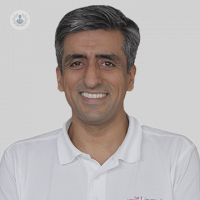How does an orthodontist treat snoring and sleep apnoea?
Autore:Chronic fatigue as a result of sleep apnoea can leave you feeling exhausted as you try to carry out your daily routine. Thankfully, the condition itself can be easily treated following a trip to your dental clinic. We’ve asked one of London’s leading orthodontists Dr Asif Chatoo to explain which devices can help to manage sleep apnoea and which lifestyle habits can be made to reduce symptoms.
What is sleep apnoea?
It’s one of a number of conditions which fall under the heading of dental sleep medicine. At the mild end of the sleep medicine spectrum, patients have snoring problems. At the other end, there is sleep apnoea. This occurs when you are sleeping and the muscles in the upper airways relax leading to a narrowing of the airway, interfering with breathing. It’s estimated that up to 6% of the adult population may have the condition.
In patients with severe sleep apnoea, the airway becomes fully constricted, the breathing stops and, deprived of oxygen, the brain sends out an emergency signal, causing a deep gasping for breath. This can happen several times an hour, causing day-time exhaustion.
How is it diagnosed?
If you have a sleep-related issue, such as snoring, you should talk to your dentist or orthodontist. Patients with severe sleep apnoea should be referred to a specialist sleep clinic, usually by their GP. Their overnight breathing and heart rate may be monitored. This can involve an overnight stay or being sent home with devices to wear overnight that will check for sleep apnoea.
What treatment is there?
Treatment is important since there is evidence that sleeplessness is linked with Type II diabetes, heart disease, impaired quality of life and increased risk of car accidents. Snorers and people suffering from mild to moderate sleep apnoea can be treated with Somnowell, a mandibular advancement appliance (MAA) device.
The device fits snugly over your upper and lower teeth at night and helps bring forward the lower jaw in order to open up the airway. I am a certified provider of Somnowell.
People with severe sleep apnoea are likely to be treated with a breathing mask, known as continuous positive airway pressure (CPAP). The mask is attached to a pump, which filters, humidifies and directs air under pressure through the nose to prevent the closure of the airway during sleep.
Can lifestyle habits reduce symptoms?
Problems with snoring or with sleep apnoea are likely to be worsened if the patient is overweight, is a smoker or over-indulges with alcohol. Taking stock of your lifestyle as well as investing in a humidifier in your bedroom or adjusting your sleeping position are all steps that are likely to be recommended.
Can it be fully cured?
A cure is unlikely. Far more probable is that a change in lifestyle and treatment, with Somnowell or CPAP, will help mitigate symptoms and improve quality of life.
When should someone see an orthodontist for their sleep apnoea?
As an orthodontist, I am adept at working with dental technician colleagues to create customised devices, whether mouthguards or braces. If you are worried about your snoring, then you could discuss it with me at your next appointment.
Click here to read a leaflet written by the British Orthodontic Society (BOS), which explains sleep apnoea and treatments.
You can book an appointment with Dr Chatoo via his Top Doctor's profile here if you would like his help in treating your snoring or sleep apnoea.




